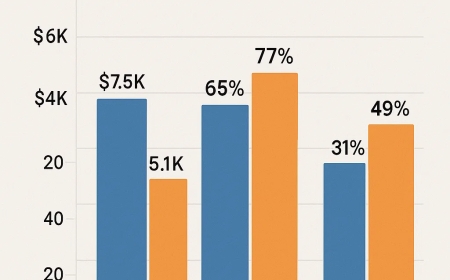How Medicare Specialists Help You Navigate Plan Choices with Confidence
Medicare can be overwhelming for many Americans approaching age 65 or those with disabilities who qualify for coverage.

Medicare can be overwhelming for many Americans approaching age 65 or those with disabilities qualifying for coverage. With a range of options, changing rules, and complex terminology, choosing the right plan often becomes a source of stress and confusion. This is where Medicare specialists come in, trained professionals who offer guidance, support, and clarity in a sea of options.
Explore how Medicare specialists can make a meaningful difference, helping individuals select coverage that aligns with their healthcare needs, budget, and lifestyle, all while boosting their confidence throughout the decision-making process.
Understanding the Complexity of Medicare
Before diving into how Medicare specialists help, its important to understand why their services are often essential. Medicare is not a one-size-fits-all program. It consists of multiple parts:
Part A (Hospital Insurance): Covers inpatient hospital care, skilled nursing facility care, hospice, and some home health services.
Part B (Medical Insurance): Covers outpatient care, preventive services, doctor visits, and medical supplies.
Part C (Medicare Advantage): A private insurance alternative to Original Medicare, often bundling Parts A, B, and sometimes D.
Part D (Prescription Drug Coverage): Helps cover the cost of prescription drugs.
Medigap (Supplemental Insurance): Helps pay for out-of-pocket costs not covered by Original Medicare.
Each part has its own rules, premiums, deductibles, and provider networks. Moreover, plan availability varies by location, and enrollees must consider annual changes during Open Enrollment periods. Without adequate support, making the right decision can be daunting.
The Role of a Medicare Specialist
Medicare specialists, also known as Medicare advisors or licensed insurance agents, are professionals trained to understand every facet of the Medicare system. Their role involves:
Assessing Your Needs: They begin by understanding your healthcare requirements, including current prescriptions, preferred doctors, medical conditions, and expected healthcare usage.
Explaining Plan Options: Specialists break down the pros and cons of Original Medicare, Medicare Advantage, Part D plans, and Medigap policies in plain language.
Comparing Costs and Coverage: They help you evaluate premiums, deductibles, copays, and coverage limits across various plans.
Identifying Cost-Saving Opportunities: Advisors often know which plans offer additional perks or savings, such as dental, vision, hearing, and gym memberships.
Assisting with Enrollment: They guide you through the enrollment process, helping you meet deadlines and avoid penalties.
Offering Ongoing Support: A good specialist provides help beyond initial enrollment, such as answering questions about billing, changes in coverage, and annual plan reviews.
Personalized Guidance for Better Outcomes
One of the most valuable aspects of working with a specialist is receiving personalized advice. Every individuals healthcare needs and financial situation are unique. For instance:
A person managing multiple chronic conditions might benefit from a plan with comprehensive drug coverage and low copays.
A healthy retiree who rarely sees a doctor may prefer a low-premium plan with fewer add-ons.
Medicare takes these nuances into account, offering recommendations tailored to your situation. They use tools and databases that show how specific plans cover your medications and whether your preferred providers are in-network.
Confidence Through Clarity
Information overload is one of the biggest challenges Medicare-eligible individuals face. With mailers, emails, and advertisements coming from dozens of insurance companies, it's easy to feel unsure about who to trust or what to choose. Specialists cut through the noise.
They act as neutral advisors (especially if they are independent agents not tied to one insurance carrier), ensuring you understand each option. Their goal is to educate, not to sell. Through clear explanations and step-by-step guidance, you become empowered to make an informed choice one that brings peace of mind instead of regret.
Avoiding Costly Mistakes
Choosing the wrong Medicare plan can be expensive. You might end up with unexpected out-of-pocket costs, lose access to your favorite doctor, or find that your medications arent covered. Worse yet, missing key enrollment deadlines can result in late penalties or a coverage gap.
Medicare help you avoid these pitfalls by:
Ensuring timely enrollment during Initial Enrollment Periods (IEP), Annual Enrollment Periods (AEP), or Special Enrollment Periods (SEP).
Double-checking plan details so you dont miss important clauses or limits.
Monitoring changes to Medicare rules and notifying you of how they may affect your plan.
Their vigilance can save you hundreds, even thousands of dollars each year, not to mention a lot of frustration.
Who Can Benefit from a Specialist?
Virtually anyone approaching Medicare eligibility can benefit from a consultation with a specialist, but it's particularly helpful if you:
Have multiple chronic conditions or take several medications.
Are on a fixed income and need to find the most affordable plan.
Travel often and need nationwide coverage.
We are overwhelmed by too many options and don't know where to begin.
Are transitioning from employer-based insurance and are unsure of how Medicare interacts with COBRA or retiree plans.
Even if youre confident in your current Medicare plan, having an annual review with a specialist ensures your coverage remains the best fit as your health needs evolve.
No-Cost Help: A Hidden Benefit
One of the best-kept secrets is that specialists typically provide their services at no cost to you. Theyre paid by insurance companies if you enroll in a plan, but a reputable, licensed agent will still present multiple options from different carriers to help you find what works best. You are under no obligation to choose a particular plan.
You can also find free, unbiased support from State Health Insurance Assistance Programs (SHIP) government-funded programs that offer counseling and advocacy for Medicare enrollees.
What to Look for in a Medicare Specialist
Not all specialists are equal. When choosing one, look for:
Licensure: Ensure they are licensed in your state and certified to sell Medicare plans.
Independence: Independent agents often offer more plan options than captive agents (those working with one company).
Experience: Look for someone with several years of experience navigating Medicare complexities.
Clear communication: They should be patient, informative, and willing to answer all your questions.
Positive reviews or referrals: Ask friends or family for recommendations or check online reviews.
Conclusion
Navigating Medicare doesnt have to be confusing or stressful. With the support of a qualified Medicare specialist, you can approach the decision with clarity and confidence. These experts dont just help you understand your options; they help you feel secure in your choice, knowing that your healthcare needs are covered without breaking the bank.
Whether youre enrolling for the first time or evaluating your coverage during the annual review, reaching out to a specialist may be one of the most empowering steps you can take for your health and financial well-being.








&srotate=0)
























